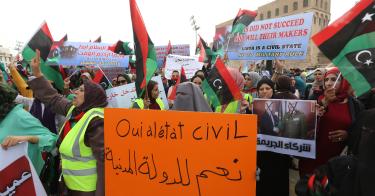In 2011, the United States led an intervention that deposed Libyan dictator, terrorist, and crackpot Muammar Gaddafi. Since then, U.S. and Western policy toward Libya has embodied every big, bad idea in our arsenal. The new civil war in Libya gives us a welcome opportunity to abandon our errors.
In 2016, then-President Barack Obama conceded that NATO’s intervention in Libya “didn’t work,” and said that his “worst mistake” was “failing to plan for the day after” the intervention. That’s too generous: as errors go, Obama’s reset with Russia was surely a bigger one.
But the Libyan war was a bungle. It’s easy to see people starved by thugs, or murdered by a dictator, as a humanitarian tragedy. But atrocities are always committed for political purposes. By intervening, you are not simply saving people. You are taking sides in a war.
That’s fine if you have a strategy for victory. But in Libya, as in Somalia in 1992, the humanitarians did not think about victory. They wanted to do good, forgetting that, in war, you can only do good if you win. And winning means more than hauling down that final enemy flag.
So the Libyan war combined the feckless humanitarianism that led to Black Hawk Down in Somalia with the failure to seriously plan for the end of the U.S. intervention in Iraq. As a British envoy put it, our intervention in Libya created “Somalia on the Mediterranean.”
The result is that Libya, like Somalia, is a mess. It’s divided between a UN-recognized regime in Tripoli, a rebel force — led by former Gaddafi ally Gen. Khalifa Haftar — in Libya’s west, and various terrorist groups, criminal gangs, and many foreign proxies.
The difference is that in Somalia, the rebels are Islamists, whereas in Libya, Hafter led the fight — with French, Egyptian and Saudi support — against Al Qaeda. Instead of waiting for a UN peace summit, he has decided to try to end the civil war by taking Tripoli on his own.
The West’s interest in Libya is that it’s a key to preventing uncontrolled migration from Africa and the Middle East into Europe. When Obama justified the Libyan intervention in 2011, he pointed to the risk that Qaddafi might drive “thousands of additional refugees across Libya’s borders.” He was right about that, but far from solving the problem, Obama made it worse.
Since 2015, the UN has pushed for the formation of a “national unity government.” The State Department has backed the UN’s efforts, with Secretary of State Mike Pompeo calling for “a political solution . . . to unify the country.”
A unity government has a nice ring to it. But the track record of making violent rivals share power is poor. We tried supporting a unity government in South Sudan, but that did not prevent a five-year civil war. Wars are caused by irresolvable political disputes. Victory is often needed to resolve those disputes. Unfortunately, no one in Libya looks strong enough to win right now.
There are no good guys in Libya. Haftar fights Islamists, but he also receives support from Russia. President Donald Trump has been criticized for taking a call with Haftar, but we have nothing to gain from giving Moscow a free run at the leader of one of the few moderately effective fighting forces in Libya.
From humanitarian intervention to lack of postwar planning to governments of national unity, Libya has been a laboratory for our bad ideas. In Libya as elsewhere, we’d do well now to remember that we can’t do good with nice-sounding ideas that connect to neither our interests nor to reality.
This piece originally appeared in Newsday



